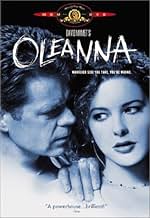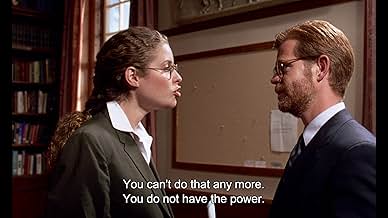IMDb RATING
6.5/10
3.8K
YOUR RATING
When a student visits her professor to discuss how she failed his course, the discussion takes an awkward turn.When a student visits her professor to discuss how she failed his course, the discussion takes an awkward turn.When a student visits her professor to discuss how she failed his course, the discussion takes an awkward turn.
- Awards
- 1 nomination total
Diego Pineda
- Quarterback
- (uncredited)
Scott Zigler
- Clerk in Copy Shop
- (uncredited)
Featured reviews
William H. Macy plays a professor, and Debra Eisenstadt plays a student who needs an A in the class she is taking from him. They argue as to why she should or shouldn't get an A. In the course of their arguing, the student finds cause to charge the professor, who is up for tenure, with sexual harassment and takes her case to the tenure committee.
The movie runs about an hour and a half. It was slow going, but as I was about to flip away from it (watching it on cable), I checked how long it had to go, and it was about half-way through. I figured, oh well, there's still some Canadian Club I need to get rid of, and tomorrow's a holiday, so I stuck with it. And I'm glad I did.
It is not a good movie, and maybe not even a very good play. Mamet's direction is ultra-stagy, even more declamatory than live theater would normally allow for, let alone a movie. For about an hour and a half, the actors hurl complete sentences and big chunks of paragraphs at one another.
Are Mamet and the actors really that insensitive to the conventions of film? Not likely. I think he chose that artificial manner in order to distance the audience from the characters and bring the ideas to the foreperhaps in the same vein as Bertolt Brecht's notion of "epic theater".
This is not so much a movie or a play as it is a staged philosophical dialogue. It examines the power relationships between man and woman, teacher and student. When the student comes to the professor to reveal the case she has built against him, it shows how words and deeds in one context can be given a whole different thrust and meaning when used to "build a case". Or are they really that different? Perhaps her case focuses and explicates the real underlying relationship of those words and deeds. Those are the kinds of questions Mamet raises, and I think it is a masterful exploration.
But is it a movie? Well, it is certainly dramatic, if stilted, and the dénoument is devastating. It may not be a good movie, but Mamet knew exactly what he was doing, and I'd watch it again.
The movie runs about an hour and a half. It was slow going, but as I was about to flip away from it (watching it on cable), I checked how long it had to go, and it was about half-way through. I figured, oh well, there's still some Canadian Club I need to get rid of, and tomorrow's a holiday, so I stuck with it. And I'm glad I did.
It is not a good movie, and maybe not even a very good play. Mamet's direction is ultra-stagy, even more declamatory than live theater would normally allow for, let alone a movie. For about an hour and a half, the actors hurl complete sentences and big chunks of paragraphs at one another.
Are Mamet and the actors really that insensitive to the conventions of film? Not likely. I think he chose that artificial manner in order to distance the audience from the characters and bring the ideas to the foreperhaps in the same vein as Bertolt Brecht's notion of "epic theater".
This is not so much a movie or a play as it is a staged philosophical dialogue. It examines the power relationships between man and woman, teacher and student. When the student comes to the professor to reveal the case she has built against him, it shows how words and deeds in one context can be given a whole different thrust and meaning when used to "build a case". Or are they really that different? Perhaps her case focuses and explicates the real underlying relationship of those words and deeds. Those are the kinds of questions Mamet raises, and I think it is a masterful exploration.
But is it a movie? Well, it is certainly dramatic, if stilted, and the dénoument is devastating. It may not be a good movie, but Mamet knew exactly what he was doing, and I'd watch it again.
Unique, hyper-real film where the dialogue is the main plot - and what a rivetting plot it is. I was very skeptical about Oleanna, and was really resistant to it - but was very surprised to find myself succumbing to it. If you love language, and know enough language, Oleanna will be a joy for you: because the dialogue is loaded with jokes about dialogue. You'll be able to pick the places where Bill Macy is saying non-words, pretentious words or jargons in his monologues - and notice where somebody is talking ambiguously, or not saying anything at all.
Its about words, talking and meaning. So there are lots of words for good reason.
Its very dialoguey dialogue: not the kind of things people say, but the kind of things writers write. Reminiscent of the verbal gymnastics of Samuel Beckett, and the twisting meanings of Catch-22. Or perhaps the comedic pretentiousness of Hal Hartley. Meaning is controlled by the powerful - that's the key. Whoever controls the conversation, the language, in this movie - controls the situation. So everything is either ambiguous or figurative. Mainly, the exact things the two say are not what's key. Its which one of them is talking.
The performances - well, Macy at least - are in an appropriately hyper-real tone to suit the hyper-real dialogue. The girl is not very good, but this is still a masterpiece of language. Its static, centring on two characters and one room, but for good reason - to put the words centre stage. I'm so shocked that i just watched a movie with two characters and one room, and was not only not bored once, but hanging on each word and found that the time flew by.
The moral of the story is that things are bound to go wrong if you talk to somebody for the length of an entire movie. You're bound to go nuts. The viewer is bound to go nuts just listening to William H Macy in the first half-hour of the movie - you'll be amazed that purely talking to someone, using words, can make you feel that you're trapped, that you can't win or even escape.
Quite brilliant, really.
8/10. Essential viewing. I never knew dialogue held this power. A unique discovery.
Its about words, talking and meaning. So there are lots of words for good reason.
Its very dialoguey dialogue: not the kind of things people say, but the kind of things writers write. Reminiscent of the verbal gymnastics of Samuel Beckett, and the twisting meanings of Catch-22. Or perhaps the comedic pretentiousness of Hal Hartley. Meaning is controlled by the powerful - that's the key. Whoever controls the conversation, the language, in this movie - controls the situation. So everything is either ambiguous or figurative. Mainly, the exact things the two say are not what's key. Its which one of them is talking.
The performances - well, Macy at least - are in an appropriately hyper-real tone to suit the hyper-real dialogue. The girl is not very good, but this is still a masterpiece of language. Its static, centring on two characters and one room, but for good reason - to put the words centre stage. I'm so shocked that i just watched a movie with two characters and one room, and was not only not bored once, but hanging on each word and found that the time flew by.
The moral of the story is that things are bound to go wrong if you talk to somebody for the length of an entire movie. You're bound to go nuts. The viewer is bound to go nuts just listening to William H Macy in the first half-hour of the movie - you'll be amazed that purely talking to someone, using words, can make you feel that you're trapped, that you can't win or even escape.
Quite brilliant, really.
8/10. Essential viewing. I never knew dialogue held this power. A unique discovery.
10oowawa
One writer perceptively suggests that the term "Oleanna" was used to describe swampland being sold as prime real estate.
I think the primary context in which the title "Oleanna" is to be understood appears in a "folk" stanza preceding Mamet's published edition of the play:
"Oh to be in 'Oleanna,'/ That's where I would rather be,/ Than be bound in Norway/ And drag the chains of slavery."
And so, Oleanna is a version of a Utopian promised land, and in the context of the play, the gateway to this better tomorrow is through the halls of Academia. Susan, the victim of her own false expectations of how the university is to transform her existence, repeatedly mentions the struggle she had to endure in order to get into college. For her, academic success is central to her vision of a better life. John, the pedantic professor, also sees Academia as the means to a comfortable, upper middle class existence with his new house, wife, and son. All he needs to do is make tenure, and his future is secured.
However, John presents himself as an academic bad-boy who debunks the very Academia with which he is trying to secure his comfortable future. This ridicule of the academic process strikes at the heart of Carol's dreams of a better future through education. She quite rightly sees that the professor is trying to have it both ways--playing the academic outsider while trying to kiss-up to the tenure committee in order to ensure his cushy new home in the suburbs. When someone's dreams are threatened, they become angry and strike out, however they can.
This is a brilliant movie. Anyone working in a high school or university, and anyone contemplating an academic career, needs to watch it, and allow it to soak deep into the structure of the brain. Perhaps that academic career isn't such a good idea, after all. Maybe that utopian real estate is really swampland. At any rate, one needs to be very, very careful when dealing with students.
I think the primary context in which the title "Oleanna" is to be understood appears in a "folk" stanza preceding Mamet's published edition of the play:
"Oh to be in 'Oleanna,'/ That's where I would rather be,/ Than be bound in Norway/ And drag the chains of slavery."
And so, Oleanna is a version of a Utopian promised land, and in the context of the play, the gateway to this better tomorrow is through the halls of Academia. Susan, the victim of her own false expectations of how the university is to transform her existence, repeatedly mentions the struggle she had to endure in order to get into college. For her, academic success is central to her vision of a better life. John, the pedantic professor, also sees Academia as the means to a comfortable, upper middle class existence with his new house, wife, and son. All he needs to do is make tenure, and his future is secured.
However, John presents himself as an academic bad-boy who debunks the very Academia with which he is trying to secure his comfortable future. This ridicule of the academic process strikes at the heart of Carol's dreams of a better future through education. She quite rightly sees that the professor is trying to have it both ways--playing the academic outsider while trying to kiss-up to the tenure committee in order to ensure his cushy new home in the suburbs. When someone's dreams are threatened, they become angry and strike out, however they can.
This is a brilliant movie. Anyone working in a high school or university, and anyone contemplating an academic career, needs to watch it, and allow it to soak deep into the structure of the brain. Perhaps that academic career isn't such a good idea, after all. Maybe that utopian real estate is really swampland. At any rate, one needs to be very, very careful when dealing with students.
The tag line of this movie is that "whichever side you take, you're wrong," is itself wrong. There clearly is a wrong and right side. If we were to sit Catherine McKinnon and Andrea Dworkin down and show them only the first half of the movie, even they would be pressed to find any sexual harassment (let alone rape). We would find a self-absorbed professor, and knifing student (whose clipped speech, and apparent dumbfoundedness is belied later when she fabricates, embellishes, and spins the truth for her PC ends). If being self-absorbed is enough to get one fired and falsely accused of rape, then Mamet's lesson must be that the feminist orthodoxy has gone too far.
The dialogue is difficult to get past -- you want to grab the characters one at a time by the throat so the other one can at least finish a sentence or thought without interruption. But if you stick with it, the characters do deliver on what had to be a difficult script. And I found the irony of the story line to be the reward. It is a mind game -- not for the casual viewer.
Did you know
- TriviaDavid Mamet's script was heavily criticized as sexist. He defended himself against this allegation in (Guardian supplement) (UK) 8 April 2004, pg. 8-9, "'Why can't I show a woman telling lies?'"
- GoofsWhen Carol leaves John's office after their second meeting, shouting "Help!", the shadow of the camera covers the door.
- Alternate versionsThere is a version of the movie circulating in Australia, in a series of videos along with other David Mamet films including "A Life in the Theater". This particular copy of the film is timecoded. In that version, after Carol tells John not to call his wife "baby," (thus sending him into a torrent of rage), and he slaps her arm and grabs her, screaming a sexual expletive and raising a chair above her head, the door to the hallway swings open and a number of people stand in the hallway, observing the fight and thus hopelessly damning John. In the version now appearing on The Sundance Channel (10/05), the expletive is unchanged but he never lifts the chair and the door never opens; aside from a final exterior shot of the school, the film ends with Carol (Eisenstadt) having collapsed on the floor of John's office, and John sitting in his chair, his head buried in his hands.
- SoundtracksLong Ago And Far Away
Words by David Mamet
Music by Rebecca Pidgeon
Soloist: Steve Goldstein (as Steven Goldstein)
© Copyright 1994 Dwight Street Music
- How long is Oleanna?Powered by Alexa
Details
- Release date
- Countries of origin
- Official sites
- Language
- Also known as
- David Mamet's Oleanna
- Filming locations
- Production companies
- See more company credits at IMDbPro
Box office
- Gross US & Canada
- $124,693
- Opening weekend US & Canada
- $25,316
- Nov 6, 1994
- Gross worldwide
- $124,693
Contribute to this page
Suggest an edit or add missing content



























